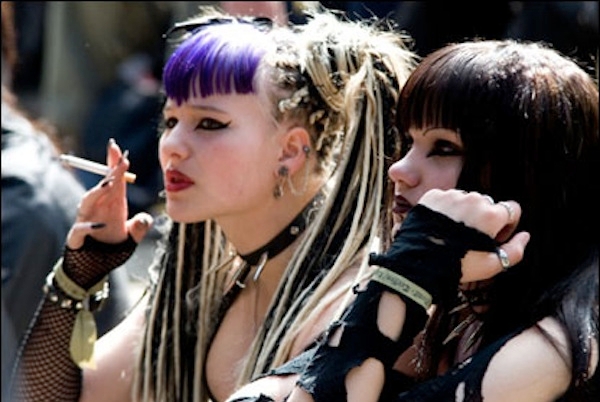So. As of last week, punching a goth is a political act in Greater Manchester, but not in Derbyshire. Sussex is still making its mind up.
Odd, yes; funny, no. As you might have read, those police forces who now define assaults on goths as hate crimes have taken this decision in direct response, pretty much, to the murder of Sophie Lancaster, 20, kicked and beaten to death in 2007, clearly, utterly and solely because of her fashion choices.
You can feel that horrible, horrible death already shutting down conversations, as horrible deaths are wont to do. So before it does, and without lessening its tragedy, and indeed, while declaring from the outset that I have always frankly felt a certain kinship with goths, let me say what plenty are thinking.
Goths. I mean, come on. Goths. We’re talking about goths here. There are ethnic minorities, beset on all sides by ceilings and walls, social and professional, glass or otherwise. There are transsexuals, for whom every walk down a crowded street brings its own terrors. There are the disabled, possibly society’s most vulnerable. Then there are goths. Who dress weird. For fun.
But perhaps I get ahead of myself. Goths? Yes? I know we might require some explanation if we were veering deep into cyberpunk, emo or psychobilly territory here, but surely, these days, we’re in fairly mainstream territory with the good old-fashioned British goth? There will be no wry letters about Visigoths, Huns et al, I hope. Just save those ones. Enjoy them in the privacy of your own homes.
The goth is a gentle soul, wearing black, preferring wilted flowers, being fond of vampires, but probably spelling it ‘vampyres’. Not to be confused with the American goth, obviously, which looks much the same, but is more likely to shoot the school sports team and less likely to read books. I used to go to a bar in Camden sometimes which was heaving with goths. Technically they didn’t let you in if you weren’t one, but I suppose my leather jacket was open to interpretation in the twilight, and the bags under my eyes could have been mascara. I always felt quite cool in there, in the sense of there not being overmuch competition. Except for in the vicinity of Leeds, where I gather the phenomenon was altogether more mainstream, a goth invariably tends, also, to be something of a geek.
And the crucial thing is, I feel com-fortable saying that. I wouldn’t with, say, Asians. Or the Chinese, or my fellow Jews, or any of those other minorities over-represented in Britain’s after-school chess and computing clubs. I suppose it would be less true, for one thing, because a group defined by mere ethnicity could contain a breadth of personality types that one defined by lifestyle probably wouldn’t. Nonetheless, it doesn’t feel the same. Most certainly, anti-goth sentiment would pass Sayeeda Warsi’s dinner party test.
What troubles me, though, is that I can find no rationale for the distinction. On the one hand, it seems to me that if we’re going to start equating anti-goth sentiment with racism, then we’ve nowhere to stop. We might as well extend that equation to anybody else disliked on the basis of their clothing, such as football fans in the wrong stand, or somebody who wanders through a gathering of Ukip members dressed as somebody who believes that CO2 makes the planet warm up.
On the other hand, I’ve a growing hunch that the problem might lie at the other end. We have no hierarchy of offence; that’s our trouble, time and again. We condemn gropers so hard that we can only condemn actual rapists very slightly more. Similarly, between a race-murderer and a man who shouts ‘nigger’ in the street, we barely draw a distinction. I understand the reasons for that, in a zero-tolerance sort of way, but it leaves us with problems. And one of them is the way that when a young, clever and interesting girl gets murdered by thugs in a park, we somehow end up believing it only happened because there’s no law against laughing at people for wearing bloody silly clothes.
Talking with Thatcher
I met Margaret Thatcher once. Visiting Edinburgh, she was put up for the night in the official residence of the Secretary of State for Scotland, who, as they say, knew my mother. We didn’t live there, but we stay the night so as to meet her. She stayed in the guest room at the top of the house; the one with the gold taps in the ensuite bathroom. I don’t remember much about Bute House, but I remember that.
Up and into our best clothes, my sister and I met her at breakfast. Us, nervous and shy; her, startlingly, much the same. She was keen to talk about attending a recent Scottish Football Cup final, perhaps sensing that we wouldn’t be terribly interested in monetarism or the West Lothian question. The trouble was, she was convinced she’d seen it at Ibrox. ‘Hampden!’ I screamed inwardly, consumed by silent scorn. ‘You were at Hampden!’
Kindly, but wholly alien, she was basically hopeless in that conversation. She was out of her comfort zone, and she knew it. She’d stared down dictators, trade unionists and eurocrats. She had fought a war, defeated the miners and seen off internal revolt. But she couldn’t cope with this. I think it was about 1988. I’d have been 11.






Comments